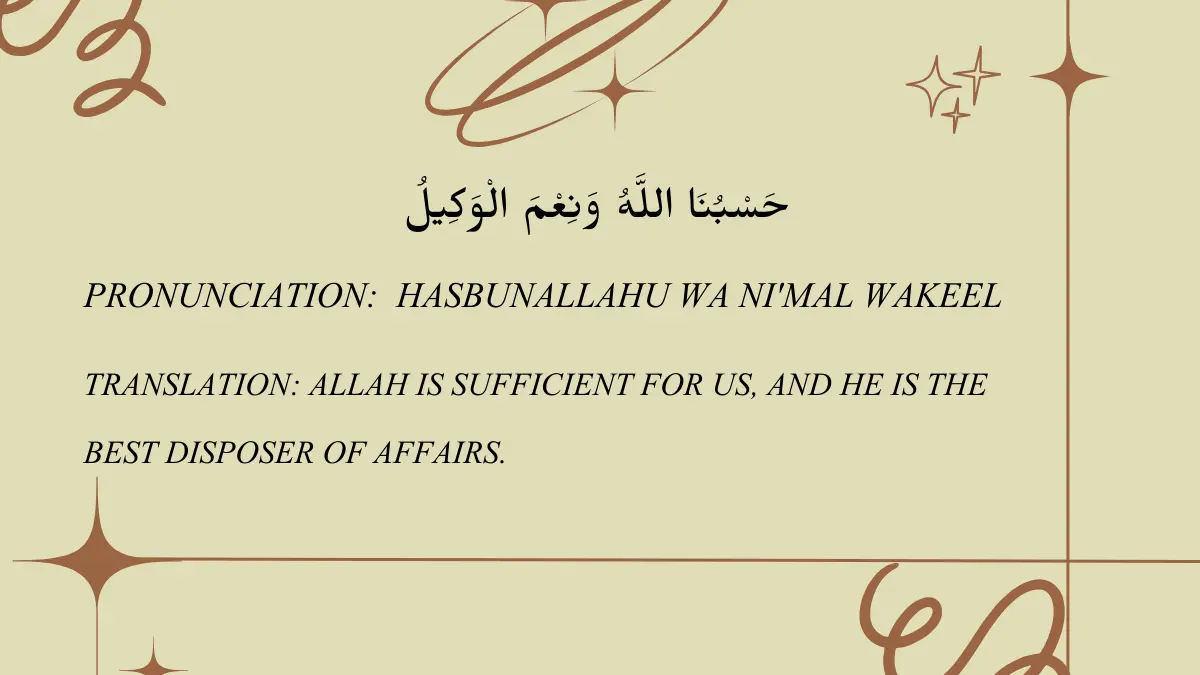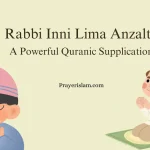In the heart of every Muslim lies a phrase that brings comfort, strength, and unwavering faith: “Hasbunallahu wa ni’mal wakeel” (حَسْبُنَا اللَّهُ وَنِعْمَ الْوَكِيلُ). This powerful expression is more than just words; it is a testament to the profound trust and reliance on Allah. In this blog post, we will delve into the meaning, pronunciation, word analysis, benefits, and best times for reciting this remarkable phrase.
Translation and Pronunciation
- Arabic: حَسْبُنَا اللَّهُ وَنِعْمَ الْوَكِيلُ
- Transliteration: Hasbunallahu wa ni’mal wakeel
- Translation: “Allah is sufficient for us, and He is the best disposer of affairs.”
Word Analysis
- حَسْبُنَا (Hasbuna): Means “sufficient for us.”
- اللَّهُ (Allahu): Refers to “Allah.”
- وَ (Wa): Means “and.”
- نِعْمَ (Ni’ma): Means “the best.”
- الْوَكِيلُ (Al-Wakeel): Means “disposer of affairs” or “trustee.”
Each word in this phrase carries a deep meaning, combining to form a powerful declaration of trust in Allah’s sufficiency and His ability to manage all matters.
Benefits of Reciting “Hasbunallahu Wa Ni’mal Wakeel
- Spiritual Comfort: Reciting this phrase brings immense comfort and peace, especially during times of stress, fear, or uncertainty. It serves as a reminder that Allah is always in control.
- Strengthening Faith: It reinforces a believer’s faith, highlighting the importance of trusting Allah’s plan and wisdom.
- Overcoming Anxiety: Regular recitation helps in alleviating anxiety and fear, providing a sense of security and reassurance.
- Enhancing Patience: It encourages patience (Sabr) and steadfastness in the face of trials and tribulations.
- Positive Mindset: Promotes a positive outlook, knowing that Allah is managing your affairs in the best possible way.
Reference in the Quran
The phrase “Hasbunallahu wa ni’mal wakeel” is mentioned in the Quran in Surah Al-Imran (3:173):
الَّذِينَ قَالَ لَهُمُ النَّاسُ إِنَّ النَّاسَ قَدْ جَمَعُوا لَكُمْ فَاخْشَوْهُمْ فَزَادَهُمْ إِيمَانًا وَقَالُوا حَسْبُنَا اللَّهُ وَنِعْمَ الْوَكِيلُ
“Those to whom hypocrites said, ‘Indeed, the people have gathered against you, so fear them.’ But it (merely) increased them in faith, and they said, ‘Sufficient for us is Allah, and (He is) the best Disposer of affairs.'”
This verse highlights the response of the believers when faced with threats, showcasing their unwavering trust in Allah.

Tafseer of Hasbunallahu Wa Ni’mal Wakeel
The Tafseer (interpretation) of “Hasbunallahu wa ni’mal wakeel” reveals its profound depth and significance in the Islamic faith. Scholars interpret this phrase as a declaration of complete reliance on Allah’s sufficiency and His unparalleled ability to manage all affairs.
- Reliance on Allah’s Sufficiency: The phrase begins with “Hasbuna Allah,” meaning “Allah is sufficient for us.” This reflects the belief that Allah alone is enough to meet all needs and resolve all problems, emphasizing the concept of Tawakkul (trust in Allah).
- Affirmation of Allah’s Power: By declaring “wa ni’mal wakeel,” meaning “and He is the best disposer of affairs,” the believers affirm that Allah is the best protector and manager of all matters. This part of the phrase reinforces the trust in Allah’s wisdom and justice.
- Historical Context: According to Tafseer scholars like Ibn Kathir, this phrase was uttered by the companions of the Prophet Muhammad (peace be upon him) during the Battle of Uhud when they were threatened by their enemies. Their declaration increased their faith and resilience, showcasing their unwavering trust in Allah.
- Spiritual Significance: The phrase is seen as a source of spiritual strength. It is a reminder that despite worldly challenges, Allah’s support is always present. This perspective is vital for maintaining patience (Sabr) and fortitude during trials.
Best Times for Reciting
- During Difficulties: When facing personal, financial, or health-related challenges.
- Before Making Decisions: To seek Allah’s guidance and blessings in important life decisions.
- In Moments of Fear: To dispel fear and anxiety, trusting in Allah’s protection.
- Daily Routine: Incorporating it into daily prayers (Dua) and supplications for continuous spiritual support.
Hasbunallah wa ni’mal wakil 1000 times
Reciting “Hasbunallah wa ni’mal wakil” 1000 times is a form of dhikr (remembrance of God) in Islam. The phrase translates to “Allah is sufficient for us, and He is the best disposer of affairs.” This invocation is often used to seek comfort, patience, and reliance on Allah in times of difficulty and distress.
Here are some steps you might follow if you want to undertake this spiritual practice:
- Set an Intention: Before starting, set a clear intention (niyyah) for why you are reciting this phrase. This helps in focusing your mind and heart.
- Create a Calm Environment: Find a quiet and clean place where you can sit comfortably without interruptions.
- Use Prayer Beads (Tasbih): If you have a tasbih (prayer beads), it can help you keep count. A typical tasbih has 33, 99, or 100 beads, so you may need to go through it multiple times.
- Focus on Meaning: While reciting, focus on the meaning of the words. Reflect on Allah’s sufficiency and His role as the best disposer of your affairs.
- Consistency and Patience: Reciting 1000 times can take a while. Be patient and consistent. You can break it down into smaller sessions throughout the day if necessary.
- Conclude with a Dua: After completing your recitation, make a dua (supplication) to Allah, asking for what you need and expressing your reliance on Him.
This practice is considered a means of drawing closer to Allah and finding solace in His remembrance.
How to Incorporate Into Daily Life
- Morning and Evening: Recite it during morning and evening supplications to start and end your day with trust in Allah.
- Before Sleeping: Recite it before going to bed to ensure a peaceful and restful sleep.
- During Salah: Integrate it into your prayers, especially in Sujood (prostration) and after Tasbeeh (glorification of Allah).
Opinions of Islamic Scholars
Islamic scholars emphasize the importance of this phrase in fostering a deep sense of Tawakkul (trust in Allah). Scholars like Ibn Kathir and Al-Qurtubi highlight that reciting this phrase reinforces the believer’s dependence on Allah’s wisdom and protection, especially in times of adversity. Ibn Kathir mentions that it is a means to increase faith and reliance on Allah, while Al-Qurtubi notes that it brings tranquility and reassurance to the heart of the believer.
Conclusion
“Hasbunallahu wa ni’mal wakeel” (حَسْبُنَا اللَّهُ وَنِعْمَ الْوَكِيلُ) is a profound declaration of faith that underscores the importance of relying on Allah. By understanding its meaning, benefits, and appropriate times for recitation, Muslims can harness the power of this phrase to navigate life’s challenges with grace and confidence.
By incorporating this beautiful phrase into your daily life, you can experience the peace and strength that comes with complete trust in Allah. Remember, Allah is always sufficient for us, and He is the best disposer of all affairs.







